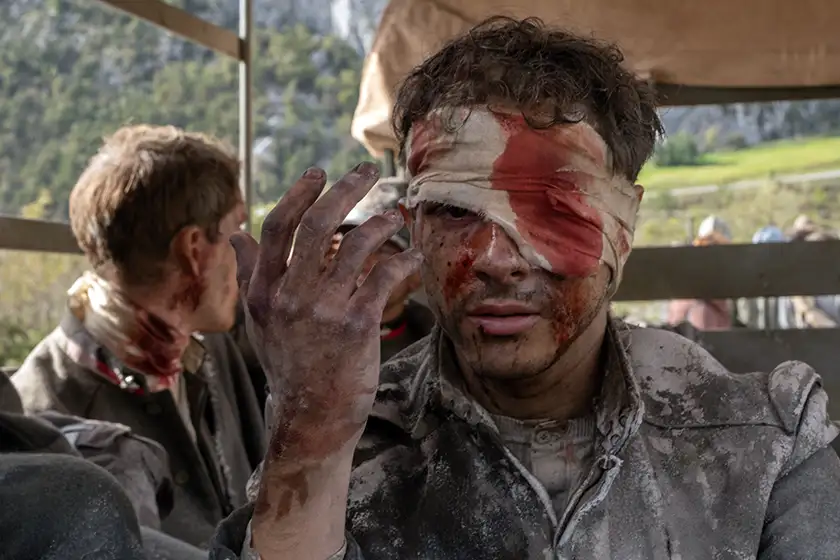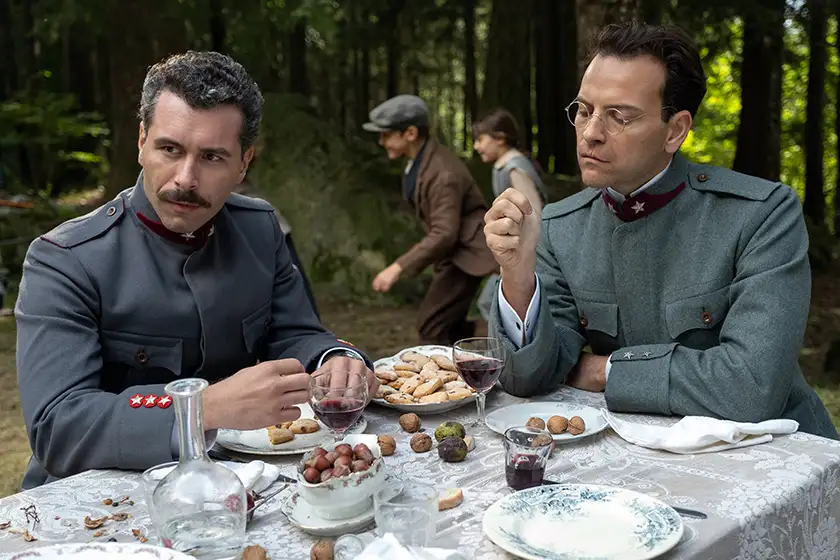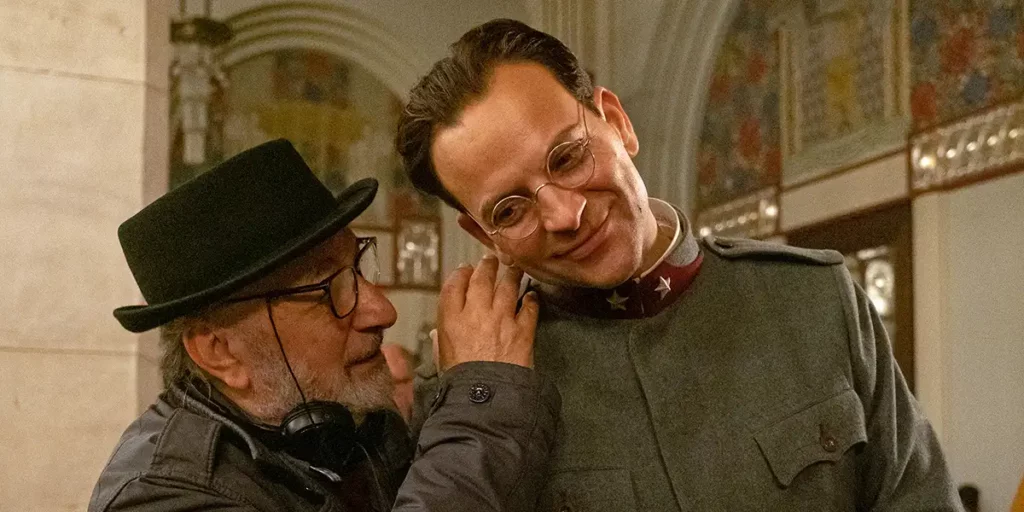In this interview with Gianni Amelio, director of Battleground (Campo di Battaglia), he tells us about how his new war drama teaches us something about today.
World War I is the backdrop in which Battleground (Campo di Battaglia) takes place. By portraying the struggles of the war, the outbreak of a global pandemic, and a divided country whose soldiers can’t even speak to each other, Gianni Amelio depicts the painful reality of Italy in the early 1900s during the war in his latest film.
Set in 1918, Battleground follows Stefano and Giulio, childhood friends who now work in the same military hospital. Every day, they see soldiers in need of medical care arriving from the front, some wounded in battles and some who hurt themselves in order to escape the war and go back home. Stefano (Gabriel Montesi) and Giulio (Alessandro Borghi, of Mondocane) have opposing views on the matter: the wealthier Stefano becomes obsessed with finding out which soldiers hurt themselves and sending them back to the trenches, while Giulio is more understanding and would rather focus on medical and biological research.
Their friend Anna (Federica Rosellini) also joins the military hospital as a nurse, as she was unable to complete her military degree, which was especially difficult for women at the time. But there is another force at play in World War I that kills civilians and soldiers alike: the outbreak of the Spanish flu, a deadly pandemic that soon spreads worldwide.
Battleground is now out in Italian cinemas, after premiering in competition at the Venice Film Festival. We sit down with director Gianni Amelio to talk about his film, and the way it can speak to today’s political scenario and portray the war in a realistic way. Read our interview!
Gianni Amelio on how Battleground can be relevant to today’s political context
Despite being set more than a century ago, Battleground still very much speaks to today’s reality. There are several factors which I think connect this movie with modern times: the wars around the world, the COVID pandemic, and the rise of the right wing across Europe. Was it your intention to deal with these contemporary issues through the historical lens of the film?
Gianni Amelio: I’ve always made movies which somehow anticipated the future, or that could suggest what would happen afterwards. For instance, Lamerica (1994) is the mother of all of the movies which followed on immigration. But while I was making it, I was thinking of my father, who emigrated to South America when I was one year old, so I was thinking of the past. In this case, with Battleground, I did not want to make a movie that would [create an association] between today and the war that has been fought more than a century ago in an educational way.
Instead, I acted according to a rage that I have inside me, as a man of his own time, against the horrors of today, which I see repeating themselves. This gave me this wish and desire for rebellion and a feeling of powerlessness. I started with one question: how do you save the victims? Or how can we save the victims? But the victims are also those who arrive on those boats from Africa, and die in the Mediterranean, and now the Mediterranean Sea has become a battleground. And what’s happening in the Middle East and Ukraine in a war which has been lasting for too long?
But in this movie there is an important line: “Here, nobody dies.” It sounds like an absurd thing to say in the context of war, or in this context of modern times as well. But that is the only way to grab onto a hope. Utopia is necessary in order for it to be turned into action, into a positive reality, because nobody wants to give themselves up to the defeat of mankind. That is the reason why I have Anna say this line – “here, nobody dies,” – while truly in the face of death.
Do you believe that directors have a responsibility to talk about the history of their country or to talk about what is happening now?
G. A.: Actors or filmmakers aren’t the only ones who have this duty; people in general have it as citizens of a country, or citizens of Europe as well, in my case. I think the European Union is something that’s necessary, but [its mission] has not been achieved yet because there is a very big and huge difficulty: we do speak different languages. The United States of America are united by the fact that they speak the same language.
Going back to Battleground, all the soldiers – non-Italian speakers cannot realize this if you read the subtitles only – they all speak different languages, different dialects. Because at that time, formally, Italy had been built, but Italians had not been built yet. We are in the same situation today: the European Union is there, but we are not united yet. Something which causes me a lot of pain as a European citizen is that I see this shift towards the right wing in countries where I would have never imagined it would happen. [The same happens] in terms of the increase and rise of racism and of despising the others in the name of power. It is a fear and a very painful alert.
Gianni Amelio on the realism of Battleground in the way he portrays World War I
The accents and dialects were really important in Battleground; I found this difference among Italians very fascinating. Did you want to show a picture of a divided Italy in the film?
Gianni Amelio: Italy was not united, and Italians were not united [at the time]. People [in general], and the soldiers as well, did not understand each other when they were talking. They would not be able to understand what dialect the comrade in the trenches next to them was speaking. They were strangers to each other, much like they were towards the Austrians, it was the same reaction, because they did not have a language that united them. For example, there is the Sardinian soldier at the beginning of Battleground that warns the others about the Austrians approaching but no one understands him because, even today, if you are not from Sardinia you would not understand the dialect.

How did you decide to portray this dualism between ethics and morals in Battleground, because you always have the person who obeys the orders and, on the other hand, the ethical question of whether these orders should be obeyed at all?
G. A.: This is exactly the dilemma at the heart of the story. It is also the focus of history: [the debate between] obeying orders or disobeying orders. When somebody chooses to disobey orders, there is always a very high price to pay. The war never solves anything, it has never solved any problems: there are only victims on both sides in every way. When two armies are fighting and shooting, they are killing each other so, really, there are only victims on both sides.
EvenItaly’s victory in the World War I was false on some level, because it was decided from the top. This is why in Battleground, I show the headline [declaring victory] turned upside down. At some point in all wars, the powers that be decide who the winner is and who the loser is. It is as if, to make it a little bit lighter, during a soccer match one of the players would go and play for the opposing team. This happened in both World Wars for Italy when the country decided to switch sides and sit at the table of the coalition of winners, that is also why Italians are considered unreliable.
In every conflict, the victims are innocent people. Not only the civilians – the children and the women – but also the soldiers who are forced to go and fight because they must obey unjust and criminal laws. I think and believe that was is a crime, I compare it to the death penalty. It is like a death sentence because the country is authorising people to do something nobody should ever do by forcing them to kill others. World War I is the symbol of this.
Battleground portrays such a realistic depiction of the war in many ways. How important was it to include the pandemic of the time?
G. A.: It was very important because the pandemic really happened during World War I; it was the end of spring 1919. I think what we should try and focus on today is a completely different type of war. It’s a war which has no starting point, you don’t know where it is coming from. It’s a war that we must be able to face and tackle, and it’s the right war to wage and fight. Ultimately, it is the war of science against all of these diseases, which can and must be defeated.
For instance, when I was a young kid, there was polio, a disease which affected children in particular and would kill a lot of kids. Today, nobody dies of polio anymore. This is because of the progress and development that science has made. [It is the same with] tuberculosis which was very strongly present in 1918 but also up to the 1950s, many people would die because of tuberculosis. Today, thankfully, this has been defeated. This fight should be continued. and this is what we should aim to do. We should be fighting these wars, this war against diseases, rather than shooting at each other.

How did you put the two parts of Battleground together, the one about the war and the one about the pandemic?
G. A.: In the second part of Battleground, we do show this. There is this strong passion pursued and carried out by [Anna], a very important figure in the film. She is a woman who, despite the fact that she’s not a doctor because she couldn’t get a medical degree, continues to carry on this fight, trying to fight diseases. She is being called Madam Doctor by the soldiers. And the fight that she’s carrying on must be continued to save the lives, so she keeps being in that place. It is not just by accident that she’s a woman: she is being called Madame Doctor by the soldiers and goes through [discrimination]. This is a very important element because we need to remember: we need to realize that the enemy is not the people on the other side of the trench but there is, instead, another war where we do have a common enemy.
Thank you for speaking with us!
This interview was conducted in Italian with a translator and then edited for length and clarity.
Battleground (Campo di Battaglia) had its World Premiere at the Venice Film Festival on August 31, 2024 and is out now in Italian cinemas.

